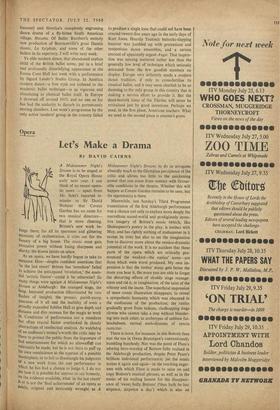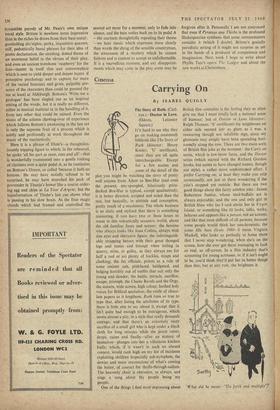Opera
Let's Make a Drama
By DAVID CAIRNS
As an opera, we have hardly begun to take its Measure. How—despite confident assertions that 'in the last resort' Britten has 'somehow' failed to achieve the anticipated 'revelation,' the essen- tial 'artistic fusion'—could it be otherwise? So many things were against A Midsummer Night's Dream at Aldeburgh : the cramped stage, the limp, bemused production (illuminated by rare flashes of insight), the prosaic, parish-pump nearness of it all and the inability of even a Proudly expanded Jubilee Hall to give depth and distance and dim recesses for the magic to work in. Conditions of performance are a mundane but often crucial factor overlooked in cloudy abstractions of intellectual analysis. As watchdog of an audience's money's-worth the critic may be there to protect the public from the imposture of bad entertainment for which no allowarfeet can relevantly be made; but he is not there to puff up his own omniscience at the expense of a possible Masterpiece, or to fail to disentangle his judgment of a new work from the one performance in Which he has had a chance to judge it. I do not sec how it is passible for anyone to say honestly, on the evidence available, what 'in the last resort' Is or is not the 'final achievement' of an opera as Subtle, original and intricately wrought as A Midsummer Night's Dream; to do so arrogates absurdly much to the Olympian percipience of the critic and allows too little to the quickening power that can come from contact with favour- able conditions in the theatre. Whether this will happen at Covent Garden remains to be seen; but the opportunity is there.
Meanwhile, last Sunday's Third Programme transmission of the first Aldeburgh performance was a chance not only to explore more deeply the marvellous sound-world and prodigiously inven- tive imagery of Britten's music (which, like Shakespeare's poetry in the play, is instinct with May, and has rightly nothing of midsummer in it except its title) but also to set the imagination free to discover more about the musico-dramatic potential of the work. It is no accident that those parts of the opera which are critically pro- nounced the weakest—the rustics' scene—are those which were worst produced. My own im- pression is that the rustics' music gets better the more you hear it, the more you are able to forget the distorting effects of shoddy stage manage- ment and rid it, in imagination, of the taint of the whimsy and the inane. The superficial impression of mere comic illustration disappears, to reveal a sympathetic humanity which was obscured in the confusions of the production; the rustics gradually grow from tedious, clodhopping stage clowns who cannot take a step without blunder- ing into each other, to archetypes of sublime f at- headedness, eternal embodiments of sancta rusticitas.
There is more, for instance, in this Bottom than met the eye in Owen Brannigan's conventionally bumbling busybody. Noi was the point of Flute's adoring hero-worship of Bottom fully realised in the Aldeburgh production, despite Peter Pears's brilliant individual performance; yet the music makes it again and again—in the touching eager- ness with which Flute is made to seize on and copy Bottom's musical phrases, as well as in the music of his wailing lament for the disappear- ance of 'sweet bully Bottom' ('thus hath he lost sixpence, sixpence a day') which is also an irresistible parody of Mr. Pears's own unique vocal style. Britten is nowhere more impressive than in the riches he draws from their base metal: gambolling six/eights, perky, inquisitive quavers, stiff, pedantically banal phrases for their idea of poetic declamation, the strutting, dotted theme of an enormous belief in the virtues of their play, and even an ancient trombone 'raspberry' for the lion—matter in itself thin and commonplace which is seen to yield deeper and deeper layers )f perceptive psychology and to capture far more of the varied humours and gross, palpable pre- sence of the characters than could be guessed (by me at least) at Aldeburgh. Bottom's 'Write me a prologue' has been singled out as an inspired setting of the words; but it is really no different, either in musical material or in the handling of it, from any other that could be named. Even the music of the solemn chewing-over of experience which follows Bottom's awakening in the last act is only the supreme fruit of a process which is subtly and profoundly at work throughout the music of the mechanicals.
Here it is a phrase of Flute's—a thoughtless, inanely tripping figure to which, in the rehearsal, he spoke 'all his part at once, cues and all'—that is wonderfully transmuted into a gentle rocking of clarinets over a quiet pedal A, as he ruminates on Bottom's Dream, so called 'because it hath no bottom: He may have stolidly refused to be surprised, he may have munched his peck of provender in Titania's bower like a tourist order- ing egg and chips at La Tour d'Argent; but the transformation of Thisbe's last cue shows what is passing in his slow brain. As, the four magic chords which had framed and controlled the second act recur for a moment, only to fade into silence, and the bass settles back on to its pedal A —the clarinets thoughtfully repeating their theme —we hear music which expresses more clearly than words the shrug of the sensible countryman, the awareness of a mystery which he cannot fathom and is content to accept as unfathomable. It is a marvellous moment, and any disappoint- ments which may come in the play scene may be forgiven after it. Personally I am not conyinced that even if Pyramus ana Thisbe is the profound Shakespearian synthesis that some commentators consider it (which I doubt), Britten's genially parodistic setting of it might not surprise us yet in "the hands of a producer of competence and imagination. Next week I hope to write about Phyllis Tate's opera The Lodger and about the new works at Cheltenham.























































 Previous page
Previous page